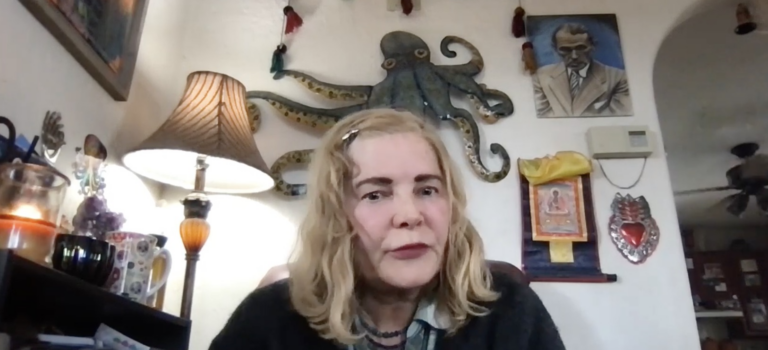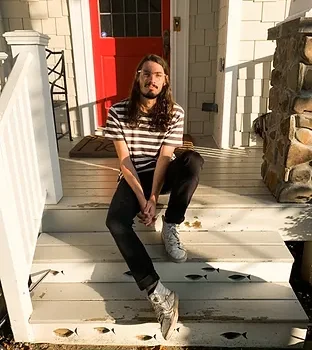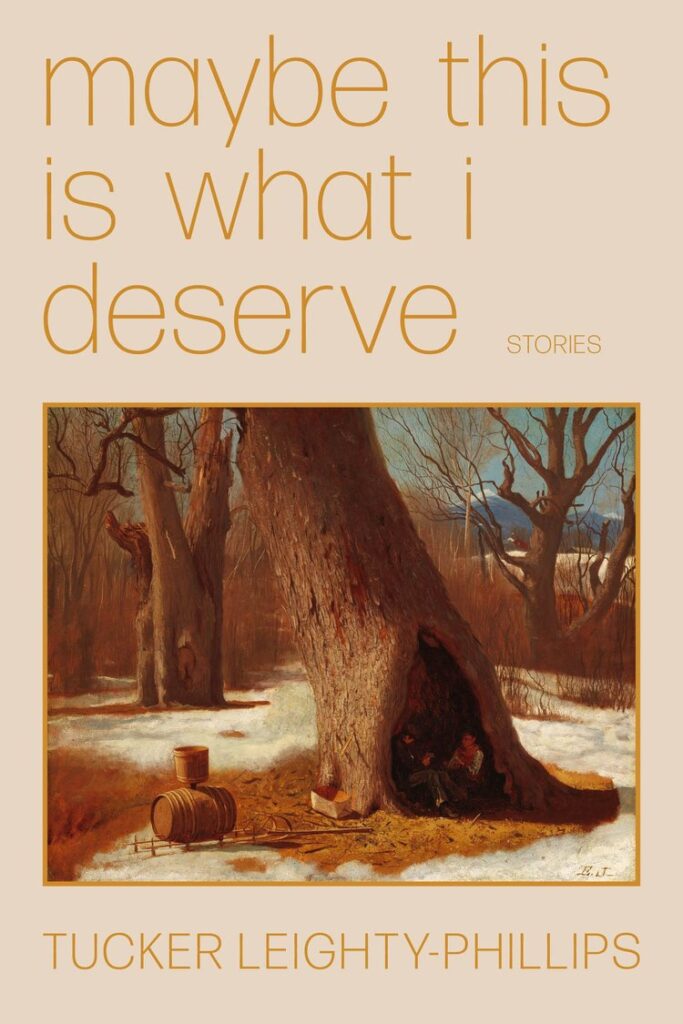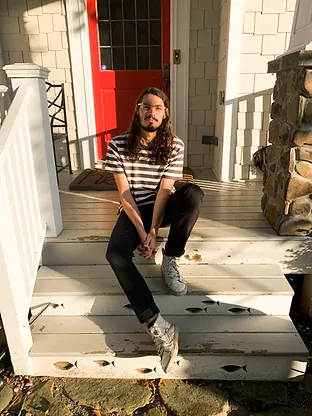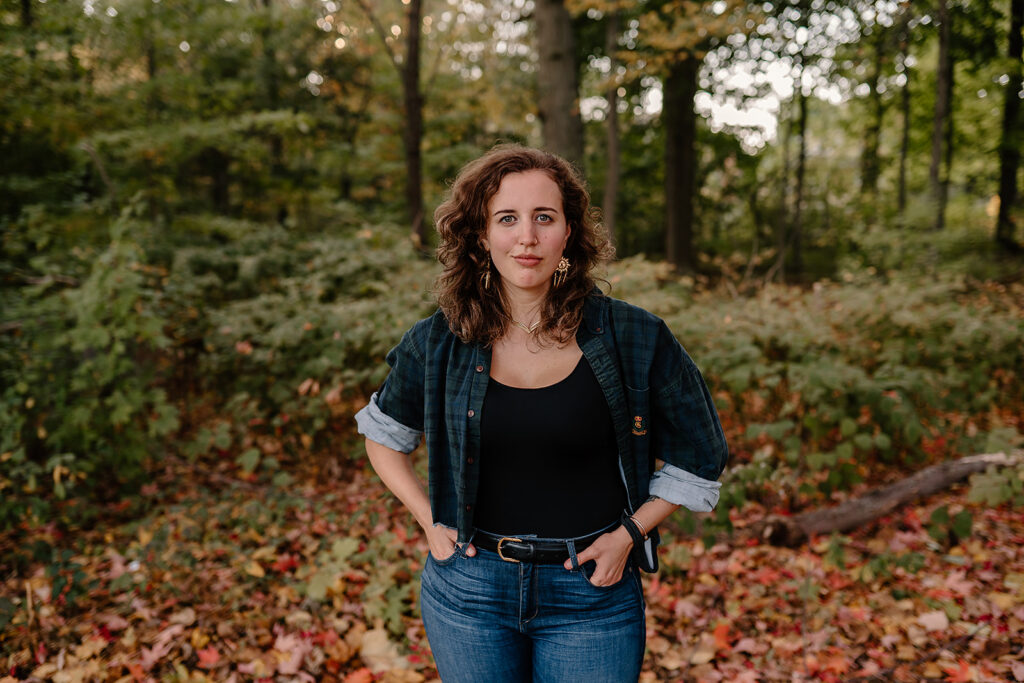
Transcribed
Family history is a tricky thing. I heard the expression from a young age “history is written by the winners” – but how does that really translate to family history? It’s hard to find anyone who is really a “winner”. Not only that, but I also think sometimes people don’t want to be the winners of their family. Or maybe they can only be the winners through omission and that’s how pieces get lost.
My Great Aunt Wren has always been a fixation. She never married or had children. She lived in the house she grew up in nearly her entire life, except for when she ran away for a period of time. I could never get a straight answer as to where she went…sometimes my mom said Maine, California…Montreal…I liked to imagine she went everywhere. She traveled the world, and then came all the way back. She died when I was 15. I feel like I was just starting to get to know her on her own terms. Right before she died she snuck me a cigarette, an American Spirit. I couldn’t finish it. She had a raspy laugh.
This is a conversation I had with my grandfather, Alder Bray. It was for a school project, but I also just wanted to record it. He was a private person, but I thought I could get him to confirm what I thought I knew.
00:00 [shuffling papers. Tap]
00:07 Bryn: Can I get your anything before we get started? Water? Seltzer?
00:12 Alder: No, I’m alright. Why are you recording me?
00:16 Bryn: For posterity…I think it’ll be nice to have a recording of you. Then I can always remember you.
00:25 Alder: Remember me? Do you know something I don’t?
00:28 Bryn: [laughs] Sorry, sorry. For way later. Years and years from now.
00:34 Alder: Alright, alright.
00:43 Bryn: First, tell me your name and where you are from.
00:49 Alder: My name is Alder Ulysses Bray. I am from Dennis, Massachusetts.
0:56 Bryn: What year were you born?
1:01 Alder: 1941. In Hyannis.
1:05 Bryn: Do you mind talking about grandma a little bit? How did you meet?
1:12 Alder: Katherine and I met through some…mutual friends. Family friends. We would have been married…uh…57 years this fall. She was an intensely giving woman.
1:33 Bryn: Yeah, mom always said she was very generous.
1:38 Alder: Yes. Generous to a fault, I would often tell her. If someone needed help, she was there. Not everyone deserved it, but that’s not really what she cared about. She was like that from the moment she met my family.
1:57 [chair creak]
2:00 Bryn: What do you mean by that? – from the moment she met your family?
2:07 Alder: She was introduced to them very early. I typically liked to wait before introducing anyone, but she actually met Wren before she met me. Anyway, she just hopped right in. The first time she had dinner with my parents, she did all the washing after. Wouldn’t let anyone else get an elbow in – she had insisted.
2:32 Bryn: That sounds very sweet. Your family must have adored her.
2:38 Alder: Yes, they certainly did.
2:42 Bryn: Where did she meet Wren?
2:46 Alder: At the hospital. Katherine happened to be working that night. Wren had to go in for…stitches.
2:54 Bryn: How old you both when you had my mom?
2:58 Alder: [cough] Sorry?
3:01 Bryn: How old were you and Grandma when you had my mom?
3:08 Alder: I don’t know. In our 20’s.
3:12 Bryn: [swallow] Can you remember anything about being new parents? What was my mom like as a baby? Or even as a child?
3:23 Alder: Oh, I guess she was a restless baby. Although all babies are. Felt like it was months before she would actually sleep. Up crying all night. Katherine would sit with her all night, rocking her to sleep. There was constantly a bottle of formula warming on the stove. You were a much better baby.
3:44 Bryn: [laughs] I imagine if I wasn’t, you wouldn’t be the one up with me.
3:51 Alder: I suppose that’s true.
3:55 Bryn: Can you tell me what Dennis was like back then? Maybe a little bit about your neighborhood?
4:09 Alder: Sure….ah, there weren’t as many houses as there are now. And certainly, no huge ones you see…just mostly little Cape Codders. P-town was still mostly just Portuguese fishermen. The farm across from where we lived was still operating…producing something. I think now it’s just a historical site. If that doesn’t make someone feel old, I don’t know what will [chuckles].
4:42 Bryn: [laughs] Well, what did they produce? The way you remember it, I mean.
4:51 Alder: They had dairy cows.
4:56 Bryn: What did your parents do?
4:59 Alder: Father’s family were ice harvesters. So, I think he did that for the first part of his life. By the time I was born, it was becoming a less…in-demand profession. He opened a hardware store in Dennis when I was…maybe 4? 5? Mother was mother, that was about it for her. She lost a lot of babies.
5:17 Bryn: That must have been hard for her.
5:22 Alder: It was. For both of them. They were just left with me and Wren by the end of it all. Now it’s just me that’s left, as you know.
5:33 Byrn: Do you sill think about your sister?
5:40 Alder: I do. I still find myself thinking I need to check in on her, but then I remember I don’t need to anymore. Must be something that becomes ingrained in you when you’re the oldest.
5:55 [papers shuffling]
5:59 Bryn: Can I ask you something that might be a little – uh – well, it’s just kind of a grim story. I found this article from 1965 and uh –
6:11 Alder: Just ask whatever it is you’re trying to ask, Bryn.
6:18 Bryn: It looks like there was an awful fire at the farm by your home. Several people died or disappeared after it…it looks like you all thought Wren was gone after…her name is listed here…what – what happened?
6:38 Alder: Is this what this has been about the whole time? Trudging up ancient history?
6:45 Bryn: Grandpa…
6:57 Alder: I’m not upset. [sigh] Wren yammered about that for years. Blamed it for all her troubles. Like we did something wrong to deserve it.
7:03 Bryn: Why do you think she felt that way?
7:07 Alder: Maybe it was easier.
7:10 Bryn: Easier than what?
7:13 Alder: Accepting what happened in her life.
7:16 [chair creak]
7:33 Bryn: Can you tell me about the fire at all? I can’t believe I didn’t know about this.
7:56 Alder: Fine, fine. There was a fire at the barn across the street from our home. Not the large dairy barn, thank God. They had a smaller barn on the edge of the property everyone called the Turkey Barn, but that must have been a relic of a time before me. I don’t recall there ever being any turkeys there.
8:12 Bryn: Did you know the Taylors well?
8:18 Alder: Sure. A lot of folks now don’t even know their neighbors. I was driving the other day and I waved at someone walking their dog. Headphones in. They didn’t even acknowledge me. It never used to be that way.
8:27 Bryn: Hmm mhm, can you tell me about the Taylors?
8:30 Alder: What do you want to know?
8:34 Bryn: I guess…can you tell me about your relationship to your neighbors? And your neighborhood?
8:41 Alder: The neighborhood wasn’t as densely populated as it is now. Wren and I could roam through woods and not see anyone or come to any real property for…miles, it seemed. We did spend some time over at the Taylors. I’d try to help them when I could, they had five children but only one of them was a son, so they could always use an extra pair of hands for the heavy lifting.
9:08 Bryn: Five children, that’s so many.
9:14 Alder: Most farmers had even more than that. But I guess the Taylors never got around to it or preferred their hired help. They would hire anyone.
9:25 Bryn: I’m not sure what that means.
9:28 Alder: Nothing…they hired immigrants and all sorts of folks…who knows if any of them had anything to do with that fire. There would be no way to trace them. No records or anything…[cough]
9:36 Bryn: Grandpa, I – I think that’s not really a fair assumption…
9:42 Alder: [scoffs]
9:45 Bryn: Do you remember the names of the Taylor’s children?
9:50 Alder: Let’s see…there was…Dorothy, she was the oldest. Very beautiful woman. Then…Susan? Samantha? Something with an S….Sarah! And Elizabeth, and…Evelyn.
10:13 Bryn: What about the son?
10:15 Alder: Hmm?
10:17 Bryn: You said there was a son. What was the son’s name?
10:21 Alder: Cormac.
10:28 Bryn: Cormac. Did you spend a lot of time with him? When you would help the Taylors?
10:34 Alder: Sure. We spent some time together. He was a nice enough kid.
10:44: [tap tap tap]
10:46 Bryn: Did Aunt Wren spend any time with the Taylors?
10:50 Alder: She did. We both spent plenty of time over there…running, shooting…that sort of thing. We had a television, but Mother was very strict about it. They might have had one too…but I never saw it. Never went in their home.
11:04 Bryn: Aunt Wren could shoot? I didn’t know that.
11:07 Alder: Oh yes, we all did. She liked to do the Annie Oakley. She would try to shoot a bullseye behind her with just a mirror and the gun on her shoulder. She missed most of the time, she had a much better shot just holding the gun normally.
11:26 Bryn: Wow. Did she learn to do that from the Taylors or…?
11:30 Alder: I’m not sure exactly, I went away for a while to work. I missed some of her teenage years.
11:35 Bryn: Were you…away…when the fire happened?
11:38 Alder: Yes. I must have been.
11:41 Bryn: I read that…Cormac was another one that disappeared after the fire. [papers shuffling] But I couldn’t really tell if that meant he died in it? It sounds like a body was never found.
11:50 Alder: No. No, he didn’t die in it. That’s ridiculous. No one thought that. Cormac ran off, as many people did those days. I think he might have even gone out to California.
11:57 Bryn: But why do you think that?
11:59 Alder: That’s just the sort of person he was. Had his head in the clouds, didn’t think about other people…his family. Sure, he worked hard but I don’t think he ever really knew the value of it.
12:07 Bryn: Did Aunt Wren spend any time with Cormac?
12:16 Alder: I suppose.
12:18 Bryn: What did they do together?
12:20 [tap tap tap]
12:22 [coughing]
12:25 Alder: It’s true, she did spend a lot of time at one point with Cormac. He might have even been the one that taught her to shoot so well. I’d have weekly phone calls with Mother and she mentioned them taking long walks together more than once.
12:40 Bryn: I see. Where were you at the time?
12:45 Alder: I was in Lowell. Worked as a truck driver for a few years. Wren wanted to go to college, and she was smart. I wanted to be able to help her with that. I didn’t want her to waste all her time.
12:54 Bryn: Did she?
12:57 Alder: Did she what?
13:03 Bryn: Did Aunt Wren ever go to college?
13:07 Alder: It’s stuffy in here.
13:10 Bryn: I have the A/C going…are you uncomfortable?
13:15 Alder: I’d rather a breeze.
13:19 Bryn: I can turn it off and open a window for you, Grandpa.
13:22 Alder: Hmm
13:25 [chair moving]
13:28 [window opening]
13:35 [inaudible sounds]
13:46 Bryn: Is that better?
13:48 Alder: Yes. We can hear the birds singing too. It’s pleasant.
13:55 Bryn: It is, Grandpa. Remember when we used to go up to Maine? You’d take me with you and your bird watching friends?
14:03 Alder: Yes, you loved it.
14:06 Bryn: I remember seeing the barn owl. That was my favorite.
14:10 Alder: I remember that too.
14:23 Bryn: Wren never went to college, did she?
14:34 Alder: No, it didn’t quite work out that way. After the fire, she was never really the same. She ran off for a while too…but she came back. She needed her family.
14:42 Bryn: She was there when the fire happened?
14:46 Alder: Oh yeah, we were all there.
14:54 Bryn: I thought you said you were away?
14:57 Alder: I must have been visiting.
15:03 Bryn: Alright…can you tell me anything you remember from that day? Did you see Cormac at all?
15:07 Alder: No.
15:11 Bryn: Why do you think Wren was never the same after that day?
15:32 Alder: I think for anyone…it’s a hard day when you realize your world is not safe. That bad things can happen. And when that shattering happens at your own home…I can only imagine what my sister was feeling. Perhaps abandoned. Betrayed.
15:55 [tap]
16:12 Bryn: Grandpa, I just want to know. Did you or Aunt Wren have anything to do with the fire?
16:16 Alder: Fires are not unheard of in the area. Sure, it’s a wet part of the country so we don’t get…sweeping wildfires like they do other places. But accidents happen. There was an accident that day. You asked what I remember? I remember that Turkey Barn going up in flames. I remember the cows were restless at the chaos, but they were tucked safely in their barns. Why would anyone have been in the Turkey Barn? It was an old barn, and not much was kept in there. There was no need for anyone to be in there for any honest reason. Ashes. That’s all that was left, and I think we can leave ashes alone. There’s nothing to find in them.
16:58 Bryn: I just…wanted to understand the truth.
17:03 Alder: I’ve told you everything that you would need to know.
End of recording.
Gloria Rose-Potts is a writer originally from Cape Cod, Massachusetts with an MFA in creative writing from American University in Washington D.C. She was a stand-up comedian for five years and traveled around the country and once to Scotland to perform. She is interested in fairy tales, ghost stories, and nature writing. She is currently working on a collection of short stories.
Antonio Folcarelli: I saw that you performed stand-up comedy for five years. How would you say improvising and developing a sense of timing influenced your writing?
Gloria Rose-Potts: What it really helped me with was developing a sense of tension. I think it is a lot of the reason I am drawn to horror and uncanny writing. Fear and laughter are really all about the control of tension with the audience or reader. It’s been really interesting writing for an unseen audience after performing for a live one.
AF: “Transcribed” has such an eerie undertone to accompany its central mystery. This comes to a head with one of the final chilling lines: “Ashes. That’s all that was left, and I think we can leave ashes alone. There’s nothing to find in them.” How do you build up a mystery in a short time without overwhelming or boring the reader? Did you have any goals in mind when you chose this ending for the story?
GR: The eerie undertone always naturally comes out when I set my stories in New England. There must be something in the gray air here.
Honestly, a lot of trial and error. I would write in a lot of details, and then scale it back. Then add things back after feedback when folks told me things had gotten too murky or confusing. For the mystery in this story, I figured I needed a clear roadmap for myself. I needed to know everything that happened, and then I could control what I wanted my reader to know.
I knew it was going to end with Alder still keeping his secrets. The genesis of this story was me thinking about how we hide information from each other, and how we twist stories to fit what we want people to believe – or perhaps what we wish were true. How does all that negotiating get communicated? How do we lie?
AF: I really appreciate the framing device of the story. It captures sounds of movement in a small room and even realistically depicts the passage of time in a conversation. How did you come up with this stylized presentation? What were some challenges or limitations that came with it?
GR: Thank you, I was really in love with the concept, and then less in love as I was sitting in my bed with my clock app timing out each line. And then I’d do a rewrite and would have to do it all over again. Absolutely maddening.
My undergrad degree was in psychology, and we had to transcribe interviews. We had to catch every single sound we heard; we couldn’t leave anything out. It was all important to the analysis. And as I said, I was thinking about how someone would withhold information and twist a story. It seemed like an interesting way to write a story, and it fit what I wanted to explore.
The biggest challenge was I love to describe a room, or the nature around people. There is none of that. To keep the dialogue authentic sounding, I had to keep it all pretty basic. I couldn’t get very descriptive, but I managed to sneak in a few flowery ~ writer-y ~ lines.
AF: In the opening paragraph, there’s this fascinating passage: “I heard the expression from a young age ‘history is written by the winners’ – but how does that really translate to family history?” Since ghost stories and folktales are so influential to our culture, what could up-and-coming writers do to avoid perpetuating stereotypes?
GR: Oh man, this is a question I will be trying to find the right answer to for the rest of my life. For right now, I can just say: read. Read everything, but especially contemporary writers. But read the original stories too and pay attention to who is translating (take a translation class if you have the opportunity). If you find one thing that speaks to you or makes sense, find out what that writer is reading. You’ll eventually make yourself a little web of content you can get stuck in like a sweet little fly.
You’ll start to notice the things that come up often and don’t ring true anymore (or never rang true). Read the non-fiction stuff about it too – sometimes clear analysis is the best thing for ignorance.
AF: In 2022, you wrote the introduction to the story “As They Always Are” by Amber Sparks in the literary journal Grace and Gravity. Could you share what it was like to write that introduction? Had you collaborated with Amber or Grace and Gravity prior to that?
GR: I did do that! It was for a class, actually. My professor was (is) the editor of Grace & Gravity Literary Magazine, and this was the From the Attic series. My classmates and I got to choose a writer who had appeared in print previously and write a new introduction to their piece. And then it all got published online.
We had a long list of amazing writers to pick from, and I had not met Amber or read any of her work at the time – but her short story was the type of writing I was aspiring to do. She was kind and thoughtful, and lovely to work with, so I felt very lucky.
AF: Do you have any new or upcoming projects you’re excited about?
GR: Currently, I am beating my head against the wall working on another short story – so yes, I am excited about that (this is what creating looks like right?). It is loosely based on Vasilisa the Beautiful – but it’s modern day and takes place in a grocery store. It is exploring hourly customer service with the help of a magical doll. Antics ensue.
